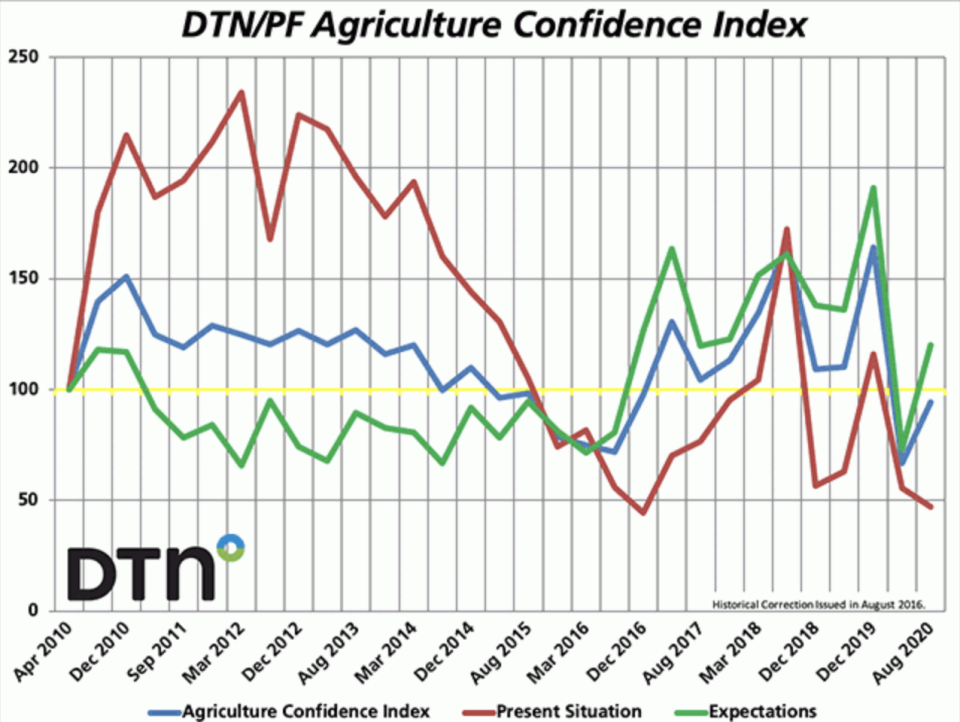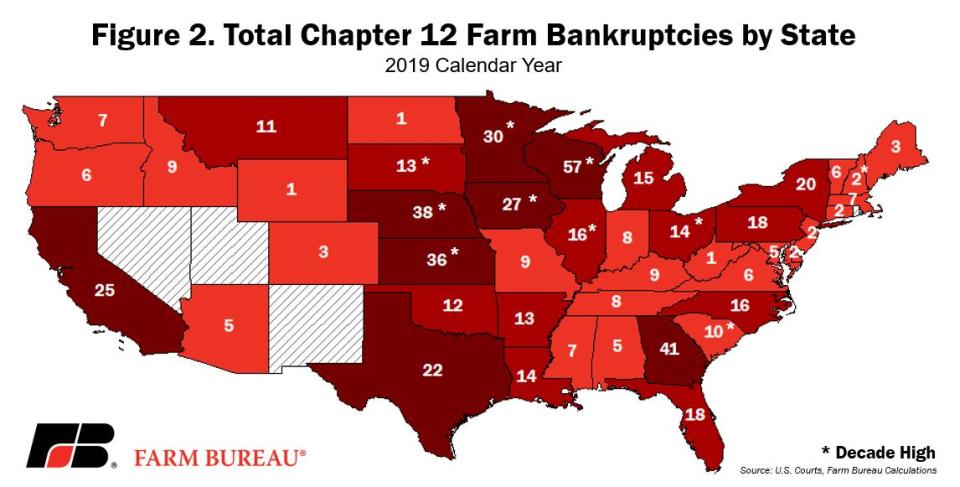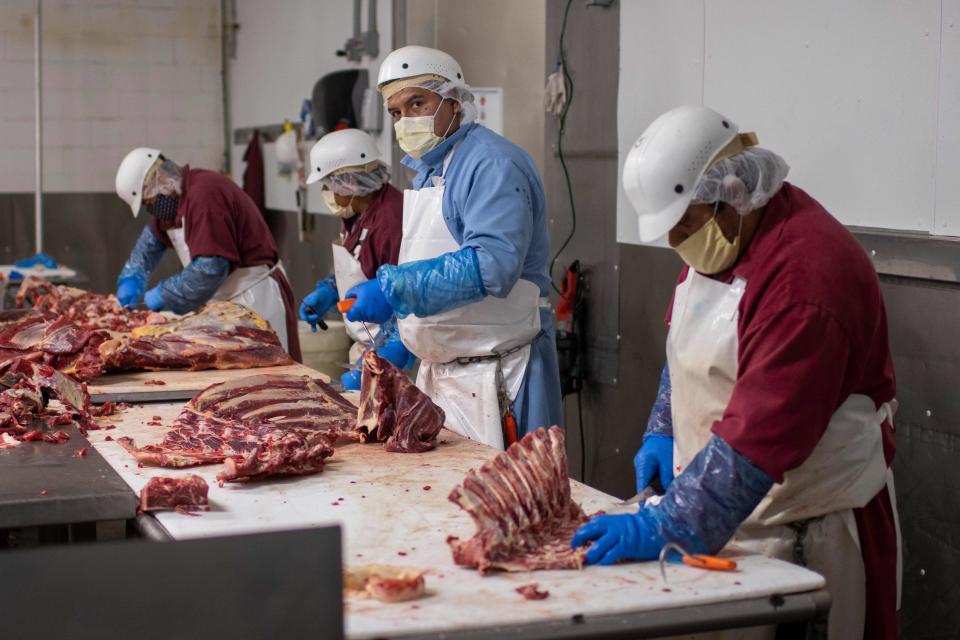Some farmers turn on Trump amid coronavirus pandemic and China tensions
President Trump’s support is waning among one of his strongest constituencies: Farmers.
“The president just doesn’t have the leadership necessary to get you through a crisis,” Darin Von Rudin, a dairy farmer and president of the Wisconsin Farmers Union, told Yahoo Finance. “When you look at what’s happening around the world, there’s other countries that have been able to stymie the crisis a lot more, and they addressed it head on rather than trying to blame somebody else for it or not listening to the experts.”
A new poll from DTN/Progressive Farmer, an agriculture website, surveyed 500 farmers across the country from Aug. 4-16 and found that 71% planned on voting for Trump — an 18% decline from April 2020. And the approval rating of Trump’s coronavirus response fell to 43%, which is 41% lower from April, with 20% stating that they were not satisfied and 37% saying they were undecided.

"More than any president in my lifetime, he acknowledged the importance of farmers and agriculture,” Cris Peterson, a Wisconsin dairy farmer, said at the Republican National Convention this week. “Our entire economy, and dairy farming, are once again roaring back. One person deserves the credit and our vote, President Donald J. Trump.”
There are approximately 2 million farms in the U.S., with roughly 98% of them being family farms. And while farmer support for President Trump took a hit, the survey found that the overall Agriculture Confidence Index actually increased by 27 points from its record pessimistic levels in April 2020.
The rise “has more to do with optimism for the future than for where farmers find themselves today,” according to DTN/Progressive Farmer. The score for the “present situation” sits at 46.9, a record low, with Midwestern farmers currently more pessimistic than farmers in other regions.

‘People just aren’t going out to eat as often’
Farmers are being hit on two fronts: Trade tensions between the U.S. and China — a massive market for American agriculture — and the coronavirus pandemic.
The U.S.-China trade war, which began in March 2018, led to the two countries imposing tit-for-tat tariffs on each other’s agricultural goods. Farm bankruptcies in the U.S. reached an 8-year high in 2019.
To help farmers offset the tariffs, the Trump administration approved $28 billion in farmer aid. More than $23 billion has been provided to producers, according to a USDA statement provided to Yahoo Finance.

The coronavirus pandemic added to farmers’ problems, sending the U.S. into a sudden recession in early 2020 that hahs severely hampered consumer spending.
“Aside from the trade issue, people just aren’t going out to eat as often,” Dave Walton, an Iowa-based farmer who grows crops like soybeans and corn, told Yahoo Finance. “They’re not driving, so they’re not burning ethanol in the fuel. They’re not burning biodiesel as a diesel fuel. Those things are direct impacts on us.”
Early on in the pandemic, many meatpacking facilities were shut down after experiencing coronavirus outbreaks among employees. The loss of production hurt hog farmers and led to fears of a national meat shortage.
“At a basic level, if you wear clothes, if you eat or you drive, you better be thankful for agriculture,” Walton said. “Because without it, you wouldn’t have any of those things. You would be naked, you’d be hungry, and you’d be walking.”

The state of the U.S. economy was the biggest concern among farmers (42%) polled by DTN/Progressive Farmer, while the health of family, friends, and employees was a close second at 40%.
In April 2020, President Trump approved an additional $19 billion in aid for farmers to deal with the fallout of the pandemic. About $9 billion has been distributed so far, according to the USDA, raising Trump’s farmer bailout to more than $32 billion.
‘We’ve lost that market and I don’t see that coming back’
Walton said that a Trump re-election would be best way to salvage ongoing trade talks with China, while Von Rudin blamed the Trump administration for creating problems in the first place.
“The trade wars that the president started have caused a lot of instability,” Von Rudin said. “And then in the beef market, the dairy industry… there just was that loss of the markets that we’ll probably never get back — or it’s going to take 15 to 20 years to build those markets back like it did prior to President Trump starting the trade wars.”

If former Vice President Joe Biden were to be elected president in November, Von Rudin argued, farmers would become more optimistic over the promise of stability and the leverage that would come with “starting to work more and more closely with our allies versus pushing them away.”
If Trump were to be re-elected, according to Von Rudin, farmers would become even more pessimistic about reaching a comprehensive trade deal China since President Trump consistently blames China for the coronavirus pandemic that began in Wuhan, China, and spread globally.
“I don’t see that happening at all with the rhetoric that’s coming out of both places right now,” Von Rudin said. “I think there’s going to be way too much friction for either side to say we can work together, which is disheartening as China’s probably one of the bigger importers of American goods and especially agricultural products. We’ve lost that market and I don’t see that coming back.”
Adriana is a reporter and editor covering politics and health care policy for Yahoo Finance. Follow her on Twitter @adrianambells.
READ MORE:
Union president blasts President Trump's meatpacking plant move as 'outrageous'
Despite trade war, most American farmers still support Trump 2020
Read the latest financial and business news from Yahoo Finance
Follow Yahoo Finance on Twitter, Facebook, Instagram, Flipboard, SmartNews, LinkedIn, YouTube, and reddit.


